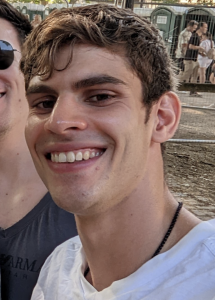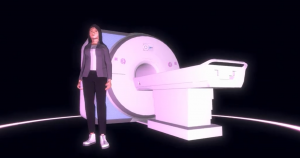
The JGI went BIG on data this June!
This June, the Jean Golding Institute provided an opportunity to explore data – its benefits and challenges – with two prodigious public events: the Bristol Data & AI Showcase and Bristol Data Week. These events helped to spark conversations about how data from the past can shape our future and create a fairer society, and how it can be used for good. University of Bristol researchers shared their discoveries and discussed topical issues with the Bristol community and beyond. We were delighted to see so many people taking part in both events; here we’ve crunched the data to share some key highlights.
Showcasing research…
The Bristol Data & AI Showcase was a massive success, and we would like to thank everyone who took part, supported the event, and attended. Taking place on 7 June in Bristol’s social history museum, M Shed, on the historic Harbourside, it offered a packed programme of talks, workshops, discussions, and interactive exhibitions. The event was open to all and completely free of charge – an opportunity for everyone to learn something new about data and the different ways it affects all of us. There were discussions about how communities use data to tackle key issues close to people’s hearts, like climate change, health, and equality.
Over the course of the day 500 people attended, from University of Bristol staff and students, to partner organisations, and members of the public. Keynote speaker Hannah Fry delivered a fascinating talk on the Joy of Data to a packed audience; and our second keynote, Neil Lawrence, was not to be missed either – he opened up discussions around the use of artificial intelligence with his talk on Understanding AI.
The keynote speakers were joined by David Silverstone, Director of Data Science for LV=GI, and Awais Rashid, Professor of Cyber Security and Director of the Centre for Doctoral Training in Cyber Security at the University of Bristol, for a thought-provoking panel discussion and a chance for the audience to ask questions.
Beyond the stimulating sessions, there was an exciting exhibition space with interactive exhibits, giving people the chance to try out the latest computer software programmes and virtual reality experiences with the experts who created them.
Out of 105 feedback responses, the showcase was rated 8.5 out of 10, with 80% of attendees rating Hannah Fry’s talk very enjoyable, and 69 people (58%) saying they were likely/or will possibly engage with the JGI/exhibitors as a result of the Showcase.
Here’s what people had to say about the event:
“Amazing organisation, great attendance, I enjoyed it a lot!”
“The showcase was fantastic, well organised and welcoming. The showcases are always great and I’m so pleased that this was held in person”
“The event was very organised, really interesting and the speakers where engaging and witty. I had a wonderful time and can’t wait to see more events like this in the future”
“Well organised and energetic event. I’m so glad I attended.”
“It was excellent. Lots of friendly helpful people and interesting activities and speakers”
“Just glowingly good quality. Great, convenient venue, nicely buzzy and busy, friendly staff, excellent presentation, nice croissant. Thank you! “
On the programme…
“Great topics, very relevant to problems facing today’s society.”
“The talks were really interesting. As someone who’s very limited in my knowledge of data and AI, I was afraid I would have felt a bit lost. But instead, I felt inspired.”
“The combination of excellent talks, exhibits and discussion worked really well.”
“The exhibitors were doing some fascinating work, really friendly and engaging group of people.”
On a diverse audience…
“I think it’s an achievement to have such diversity [of audience and participants] in this type of event.”
“I enjoyed meeting such a wide range of people from different backgrounds.”
“It was great to get together with like-minded people and talk data, something I have really missed over the pandemic.”
On sharing thinking…
“It opened my research up to a whole new audience.”
“I found it inspiring and has helped me to try and think differently about my research.”
“I like the multidisciplinary nature of the event. It was super nice to see what data scientist in other fields are working on, as well as discovering the topic of common interest across fields.”
“Lots of interesting perspectives and insights that I have been able to bring back to my company.”
“It has fuelled my interest in AI and how to use it creatively in my own work.”
On learning about the University…
“I enjoyed getting to know about all the AI related research happening at the University of Bristol.”
“I liked hearing what people had to say about their work – I now feel more connected to the University of Bristol.”
You can catch up on recordings of the sessions from the Bristol Data & AI Showcase on our YouTube playlist.
________________________________________________________________________________________________________
Bristol Data Week 2022
5 days, 989 attendees, 44 events, 20 collaborators
Following on from our Showcase event, we delivered a week-long series of talks, training sessions, and workshops for those wanting a deeper dive on data and AI.
Bristol Data Week 2022 took place from the 13th to the 17th June, and explored how we can make data work for everyone. We delivered an extensive programme of speakers, in-person and online, open to all and completely free of charge.
There was a total of 44 sessions throughout the week, from training on how to use Python and R, ethics workshops, a Tableau masterclass, data in healthcare seminars, interactive gaming demos, a celebration of data in digital arts and humanities. And the week culminated with a special film screening announcing the winners of the JGI Data Science and AI Film Prize.
On average, sessions rated 4.73 out of 5
Here’s what people had to say about the sessions:
Text and Sentiment Analysis in R
“Christopher and James were amazing team as teacher and support in the chat. It was the best learning experience I’ve had and recommend to anyone.”
Introduction to Data Analysis in Python
“This was a great course. The instructor Matt Williams explained all the steps very well and he is an excellent teacher. Also the break-out rooms were very helpful. Thanks a lot to all the people from JGI!”
Introduction to Deep Learning
“Great session, very easy to follow along and quite informative – thanks for holding it!”
ACRC Introduction to Data Analysis in Python
“The session was great and very useful, I really enjoyed it! The presenter and the supporting person in the chat were really knowledgable, I’ve learnt a lot!”
“A fantastic session on Applied Data Analysis in Python, containing so much very useful information on Machine Learning, and very good explanations both from the instructor Matt Williams and from Christopher Woods in the chat! Thanks a lot. The instructor Matt Williams is an excellent teacher, it was great to follow the programming steps in parallel to the explanations during the course. Thanks a lot also to all the other team members who were helping with useful explanations in the chat.”
Introduction to Deep Learning
“Great sessions. Really enjoyed the interactive nature of the course. Learned a lot that I will be applying in my work.”
Deep learning workshop
“Excellent, well run, informative, clear, great speaker, pragmatic as well as just enough theory. Really liked the narrative in the chat too, very helpful. Thanks very much for sharing your knowledge.”
ACRC Beginning R
“This was a fantastic course. Christopher Woods is an excellent teacher, explains everything very very well, and it was a pleasure to follow the different programming steps and listening to the explanations! Moreover, the help in the chat was really good. Thanks a lot to all of the team of JGI. Will highly recommend the course.”
“Great event, please do that every year”
You can catch up on recordings of the sessions on our Bristol Data Week YouTube playlist.






 Join us at the
Join us at the